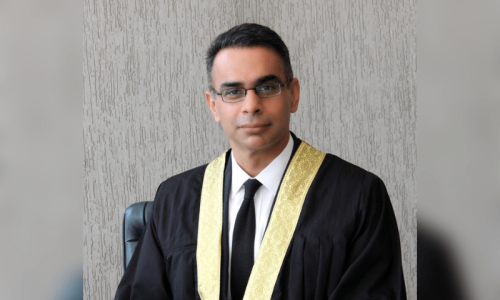KARACHI: Many perspectives on whether women’s empowerment is a victim of poor governance were presented at a seminar on the issue organised by the Pakistan Women’s Foundation for Peace (PWFFP) at a hotel here on Sunday.
“Women are 51 per cent of the 200 million population of Pakistan. They come around to 110 million that way. Even if a few of them have become pilots and are flying in the skies, a majority of their sisters on the ground still walk barefooted for miles carrying water to their homes. Muttering or grumbling in our drawing rooms over how women are treated unfairly in our country is not enough. You have to come forward and demand recognition and equal status,” said PWFFP chairperson Nargis Rahman.
Social scientist Dr Asad Sayeed said Pakistan had a plethora of laws in favour of women such as a law against forced marriages, law against domestic violence, law against DNA testing of rape victims, but they weren’t implemented while the laws created that might hurt the rights of women got implemented quickly and easily. “There is empowerment and there is governance. Empowerment to me is a big part of a struggle against patriarchy. Efforts to fight patriarchy are reduced by using religion as an excuse,” he said.
Take a look: Women's Day: Movers and shakers share their though
Activist Sabiha Shah said that as women tried to move ahead and increased pace to reach their goals, they were pushed and shoved. “Most of the time others get hold of our legs which are then pulled from behind to make us stumble and fall on our faces,” she said.
“Even when there are punishments in place for domestic violence and the police’s attention is drawn towards a case, they call it a personal issue and ask the husband and wife to settle the issue between themselves.”
Media person and teacher Dr Huma Baqai said that when she taught girls in college, she often saw many of her students getting married at a young age. “They’d tell me that they were getting married so they would be leaving their education but I would remind them that they were only getting married, and that it didn’t mean that their lives were ending,” she said.
Stressing that more women were needed in decision-making roles in Pakistan, Dr Baqai said that until they didn’t have women in the United States Congress, all the money for medical research was being spent on studies about why so many men were dying of heart attacks. “But 20pc more were dying from breast cancer in the US at the time and nothing was being done about researching that until women entered the Congress,” she said.
Researcher, activist and resident of Tharparkar Dr Sono Khangharani said that while working for the empowerment of the poor women in Tharparkar he realised that the women there first needed economic empowerment. “Even if they start earning a single rupee, their role in the household changes and they become a part of the decision-making,” he said.
Then, he said, if they had proper sanitation in their homes it gave them privacy and dignity. Most women in the rural and urban settings were water managers in their homes. “So,” he added, “if they spend less time in that with worrying about other things such as health matters, if they are also provided with health insurance, they can turn their attention towards other things such as their children’s education.”
Justice Shaiq Usmani said there was no doubt that education played a major part in women’s empowerment and education was the responsibility of the government. “You give women opportunities for educating themselves and they never take it for granted, getting more marks than the male students while leaving them far behind,” he said while suggesting that martial art training, too, be made compulsory in all girls schools and colleges. “Men think that they are strong physically so they should be running the world. Let’s just end it all by making our daughters strong, too, by training them in judo and karate.”
Dr Shainda Moonis, Prof Shaista Zaidi and Dr Aliya Imam also spoke.
Published in Dawn, March 9th, 2015
On a mobile phone? Get the Dawn Mobile App: Apple Store | Google Play












































